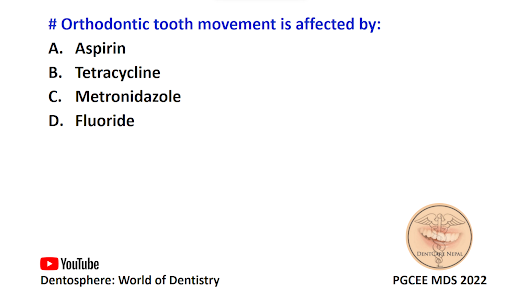# Orthodontic tooth movement is affected by:
A. Aspirin
B. Tetracycline
C. Metronidazole
D. Fluoride
• Prostaglandin E plays an essential role in the cascade of signals that leads to tooth movement, so the inhibitors of its activity affect tooth movement. Drugs that affect prostaglandin activity fall into two categories: - corticosteroids and nonsteroidal anti-inflammatory drugs (NSAIDs) that interfere with prostaglandin synthesis and - other agents that have mixed agonistic and antagonistic effects on various prostaglandins.
• In the body, prostaglandins are formed from arachidonic acid, which in turn is derived from phospholipids. Corticosteroids reduce prostaglandin synthesis by inhibiting the formation of arachidonic acid; NSAIDs inhibit the conversion of arachidonic acid to prostaglandins.
• Most NSAIDs (aspirin, ibuprofen, Naprosyn, and many others) are prostaglandin inhibitors. The major exception is acetaminophen (Tylenol), which acts centrally rather than peripherally.
• This raises the interesting possibility that the medication used by many patients to control pain after orthodontic appointments could interfere with tooth movement. Fortunately, with the low doses and short durations of analgesic therapy in orthodontic patients, this does not occur, but it can become a problem in adults or children being treated for arthritis.
• It has been suggested that acetaminophen (Tylenol) should be a better analgesic for orthodontic patients than aspirin, ibuprofen, naproxen, and similar prostaglandin inhibitors because it acts centrally rather than as a prostaglandin inhibitor.


No comments:
Post a Comment
Add Your Comments or Feedback Here